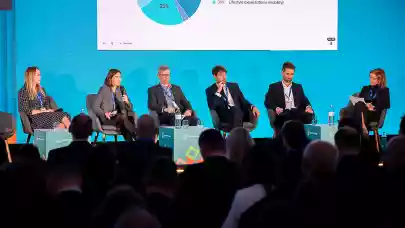
Real estate valuers must work to the highest standards as they play a critical role in supporting markets by creating consistency and transparency. David Dušek (Czech Banking Association), Barbora Rýdlová (VŠE – Prague University of Economics and Business) and Petr Polák (Ministry of Finance of the Czech Republic) talked to Property Forum about the current state of the valuation profession and the challenges expert valuers face on the Czech market.
What are your expectations for the Czech economy’s growth in 2021?
David Dušek: Bank economists represented in the Czech Banking Association's macro prognostic panel raised the original estimate of GDP growth for this year to 3.3% in May due to promising signals of the impending recovery, while slightly adjusting the estimate for 2022 downwards to 4.3%. Most of the risks remain related to uncertainty about the further development of COVID-19 and its economic implications, including a serious shortage of some overseas subcontracting. In my opinion, it is still true that we are facing primarily a health crisis with economic consequences.

David Dušek
Head of Real Estate Valuation Department
UniCredit Bank Czech Republic and Slovakia, a.s.
What are some of the major trends impacting the development of the Czech economy right now?
David Dušek: The development of the Czech economy is, of course, influenced by measures related to COVID-19. On the one hand, unemployment is low despite the pandemic, although its structural problems persist. On the other hand, public finances ended in deficit in the last pre-COVID year, and the accumulated public debt thus rose, and it is a question of its consolidation. And we also have a higher rate of inflation than that targeted by the Czech National Bank. The significant rise in prices also applies, for example, to residential real estate, which has risen in double digits over the last year. The increase in the Czech Republic was among the highest in the annual and three-year horizon in Europe. In this context, the CNB estimates that flats in the Czech Republic are overvalued for households with median incomes by an average of 18%, in localities with a high share of investment flats by up to 25% or more.
Petr Polák: Current demand on the residential real estate market significantly exceeds supply. Further growth can be expected especially in recreational properties, above all in rural houses, cottages and garden houses. Short-term rentals in tourist destinations have fallen on tourism, while long-term rentals are growing on a global scale.

Petr Polák
Head of the Property Valuation Department
Ministry of Finance of the Czech Republic
How does the regulatory system keep pace with such changes, to ensure confidence is maintained?
Petr Polák: As a result of the COVID-19 pandemic, demand in the Czech Republic was postponed and the supply of residential real estate reduced. This now generally leads to an increase in property prices. The state, therefore, amended the conditions for granting guarantees and support to young families for the acquisition of first homes (apartments, family homes). They have been adjusted to make them more accessible and usable to this population group.
Real estate valuers must work to the highest standards as they play a critical role in supporting markets by creating consistency and transparency. Can you explain the role of your organisation in real estate valuation?
David Dušek: The Czech Banking Association is a voluntary association of banks and building societies operating on the Czech market. The topic of real estate valuation is a very important one for the bank's risk management, which is why the CBA structure also includes a working group for property valuation. The aim of this group is to harmonize and jointly interpret the various basic terms and approaches used in real estate valuation, increase the quality of valuation and professionalism of valuers and, last but not least, develop legal requirements and expectations arising from banking supervision conditions in the interest of improving the quality of services provided to end-users, i.e. bank clients. The working group has therefore compiled and published Real Property Valuation Standards for Collateral Valuation Needs of Financial Institutions and it’s permanently discussing this issue with all stakeholders. Individual members of the group also participate in the educational process of valuers, including their certification.
Petr Polák: The Ministry of Finance's role is to establish clear rules and procedures for the valuation of real estate and movable property owned by both the private and public sectors or the state and for the determination of property taxes.
What are the main characteristics of the local licensing system for real estate valuers? When did the last revision take place? Are there any changes in the pipeline?
Barbora Rýdlová: Real estate valuers in the Czech Republic can provide professional services on the basis of a qualified trade license or on the basis of the Ministry of Justice´s authorisation as an expert witness.
The qualified trade license for real estate valuers requires a university degree in a study program and a field of study focused on property valuation or a university degree, higher or high school in real estate plus 4-semester accredited study program in real estate valuation. The 4-semester study program can be replaced by 2 years of practice in real estate valuation. This qualified trade license legislation has been stable for 10 years and I am not aware of any changes in the pipeline.
With effect from March 2020, there is an important change in the legislation regulating subjects on the real estate market. The Trade Act stipulates new requirements for the trade license for real estate brokerage which newly became a qualified trade license. The new requirements are focused on proper education in the field of real estate and professional practice. The law was welcomed by the professionals on the real estate market as a means of raising the quality of services and protection of real estate transaction parties.
From January 2021 a new Act 254/2019 Sb. on experts (expert witnesses), expert (witness) offices and expert institutes came into effect. It has been a long-time expected act, since the being-replaced Act on expert witnesses and expert translators dated originally to 1967 with amendments in the meantime. It is a major legislative change that influences real estate valuation experts a great deal. It stipulates new requirements to obtain the Ministry of Justice authorisation not only for experts themselves but also for companies and institutions that provide expert valuation services. The requirements to obtain authorisation are focused on education, the length of professional practice and an entry exam. The compulsory minimum professional insurance was newly enacted for both, experts and expert companies. One of the changes that are not very well accepted and criticised on the market is the obligation to work either as an individual expert valuer or as an expert within a company, which cannot be combined anymore, not even for different fields. Each company providing expert real estate valuer services is obliged to have minimally 2 employees (authorised real estate expert valuers). The new Act, besides others, also regulates the price of the service for state bodies (i.e. courts), which unfortunately remain still below the market price of the valuation services, responsibility for the expert opinion provided as well as the possible misconduct. 2021 is a year of uncertainty for expert valuers since the processes need to be changed, new bodies should be created and market players need to cope up with new legislation.

Barbora Rýdlová
Head of Department of Corporate Finance and Valuation
VŠE – Prague University of Economics and Business
Do the current applications of valuation methodologies meet market requirements? Do valuations provide enough information to clients and others who rely on them about the factors that have influenced the valuation opinion?
Barbora Rýdlová: From my perspective, the current applications of valuation methodologies in the Czech Republic are of a much-differentiated quality. Some of the valuers tend to input data rather formally without respect to current or expected market development. They tend to rely on valuations based on legislation rather than market data when estimating the market value. On the other hand, there is a rising number of experts who can assess and obtain relevant market data and information and use it properly in quality valuation reports. The situation is getting better due to the better accessibility of local market data in charged professional databases. Global players on the market also create positive influence, bring international know-how and pressure to comply with international professional standards. The rising number of real estate conferences with a high attendance rate is a positive sign as well since it is a means of information exchange for the market.
What I still miss and the new Act did not regulate at all is the requirement for continuous professional development. Many years serving at the Regional Court of Justice in Prague, dealing with complaints on provided valuation reports persuaded me that continuous professional development is a must in valuation and until the Czech Republic will not, like other developed countries, require it, the quality of valuation reports cannot be adequate.
The valuer must be a trusted professional, as they are an important resource to their stakeholders, and they must act in the public interest. How do local valuation standards support this? How do they compare with the IVS (International Valuation Standards), for example?
David Dušek: As I said, the CBA has released Real Property Valuation Standards for Collateral Valuation Needs of Financial Institutions. They contain a set of minimum standards of valuation, which is based primarily on Czech and EU law, but also a set of recommendations, procedures and best practices. They deal with the person of the valuer, his professionalism, independence, education and certification. Compared to the IVS, this is a document that covers only part of the valuation (exclusively real estate and valuation for financial purposes), on the other hand, it addresses the issue in some respects in more detail and taking into account local specifics. They are available for everyone at www.czech-ba.cz.
Barbora Rýdlová: The Faculty has been trying to promote local valuation standards (including real estate) for years. They basically comply with the International Valuation Standards and go to more detail in some aspects. There have been our drafts of the local standards published but unfortunately, they are not recognized by the regulators and broadly accepted. Since the valuers are “disintegrated” in many chambers and associations it is almost impossible to come to a consensus and become a strong partner in the dialogue. However, many professionals declare compliance with IVS or EVS or RICS Red book and it is slowly becoming a standard. The other thing is that sometimes I notice the declared compliance might be rather formal than factual. I believe the lack of broadly accepted standards is the weakest spot of the Czech real estate valuation market.
Petr Polák: The Ministry of Finance is responsible for drafting valuation regulations. They provide a legal framework and lay down rules for the public and private sectors. The whole valuation process is a highly specialised activity and therefore these rules foresee and anchor that this activity is carried out by certified valuers or by the state provision of the assessor (state-specific valuers). These rules freely implement the general valuation procedures and principles contained in the IVS (International Valuation Standards).
Is there an open and regular dialogue taking place between valuers, end-users of valuations and regulators in the Czech Republic? What are the common denominators for such dialogues?
David Dušek: Such a dialogue exists, although it is true that the valuer community in the Czech Republic is fragmented, valuers are associated with a relatively large number of chambers and associations, which makes the dialogue more complicated. From the banking point of view, we mainly discuss the view of real estate and its value as collateral for loans and we emphasise the specific needs of valuation for this purpose.
Barbora Rýdlová: The Faculty is a place where academics, professionals and regulators meet. Many times the academic lecturers also work as professionals in the field or in the regulating bodies. The Faculty members are also appointed to advisory boards of the regulators. The most frequent and long term dialogue focuses on valuation standards and new legislation discussions and comments.
Petr Polák: Yes, such a dialogue is in progress. The aim of the joint dialogue is to unify procedures and to achieve an acceptable assessment for all stakeholders. The aim is to prevent conflict and litigation. Such an approach can, in particular, save considerable time and public funding in the public sector.
How many valuers are currently practising in the Czech Republic?
David Dušek: The number of valuers working for banks in the Czech Republic is relatively large. There are about a thousand natural persons, about a hundred legal entities (but here the amount partially overlaps when a natural person is also part of the activities of a legal entity). Banks also employ internal valuers. In total, there are about 1100 experts.
Barbora Rýdlová: In 2007, there were 3178 individual authorised expert real estate valuers, in 2016, 2716 and by 2021 their number further decreased to 1981, according to Ministry of Justice data. This number has been declining for a long time and between 2020 and 2021 the number dropped further as a consequence of the effects of the new Act starting from January 2021. In my personal opinion, the long-run decline can be attributed to several causes. The first one is that banks in general do not require the real estate valuation for mortgages to be performed by an authorised expert valuer. The mortgage valuations can be provided by valuers based on the qualified trade license. Another cause might be very low service price regulation which discourages new professionals as well as the existing together with high responsibility and stress connected with expert witness profession.
How many students are studying to become real estate valuers at the moment?
Barbora Rýdlová: There are two leading institutions offering education for real estate valuers: the Prague University of Economics and Business and the Brno University of Technology. At the Faculty of Finance of the Prague University of Economics and Business real estate valuation education is provided at three different levels.
Real estate valuation can be studied within the Master´s degree main program “Finance and Valuation” or within a side specialization at Master´s level Business Valuation. The programs are primarily focused on business valuation but they include a real estate valuation course. The real estate valuation course is passed by 70-80 students each semester.
There is an accredited 4-semester continuous professional development program named “Real Estate Valuation” organized by the Institute of Property Valuation. It is primarily designed for people who need to pass the course as a legal requirement to become real estate valuation experts authorised by the Ministry of Justice. The program opens yearly and the intake is about 50 people on average.
An RICS accredited 4-semester MBA program titled MBARE Real Estate and Valuation is also available. It is designed not only for valuers but for all real estate professionals, the scope is broader, not only valuation but also market analysis, financing, investment and development, real estate law, taxes and accounting is taught. At the moment, MBARE has got 39 active students in 2 cohorts. The intake is yearly and is limited to 24 people maximum.
Is ethical behaviour part of the curriculum for students studying real estate valuation? How do you see the status of professionalism on the market?
Barbora Rýdlová: Ethics is one of the courses included in the MBARE curriculum but it is rather an exception than a standard in real estate education. The Faculty of Finance and Accounting is aware of the importance of ethical principles in finance in general and one of the priorities of the following years is to integrate ethics into the curriculum of all the programs. From my perspective, it is one of the weaknesses of the Czech real estate market that ethical principles are sidelined. To support this opinion – real estate valuers do not have a functional association or chamber which would be promoting the ethical codex and which would be authorized to deal with breaking the ethical rules of their members like it is with tax experts or auditors. Thus, ethical behaviour remains unenforceable and many times without appropriate consequences. Therefore, we appreciate and support the RICS ethical standards and their promotion in the Czech Republic.
How can the valuation profession, the education system and policymakers work together to train the next generation of valuers? Is there a skills gap and how do education providers equip their students with the right skills?
David Dušek: I consider it important to involve practitioners in the training of valuers. I perceive the education of future valuers as a mosaic, the fragments of which form both theory and practical knowledge from various fields related to real estate valuation. I currently see the biggest gap as the possibility for junior valuers to gain quality practical experience after their studies, which is no less important.
Barbora Rýdlová: I believe there is a gap in university master degree programs specifically in real estate finance and valuation. The Faculty is considering the development of such a program based on the experience of continuous professional development courses already provided. A good way to attract the best students to choose their path in valuation also leads through tight cooperation between the student and the supervisor - the professional on the thesis based on market data or real-life cases. It is also crucial to open the real estate world for the students by organizing extra lectures and workshops with the leaders in the profession.
Petr Polák: Representatives of the Ministry provide training valuers, explain the legislation to them, participate in their valuation education. In doing so, the valuers provide them with feedback on the functioning of the legislation. The legislative process involves mainly the professional public, i.e. the valuers, the Association of Cities and Municipalities, the professional association of valuers, the Czech Nanking Association and other interested groups.




